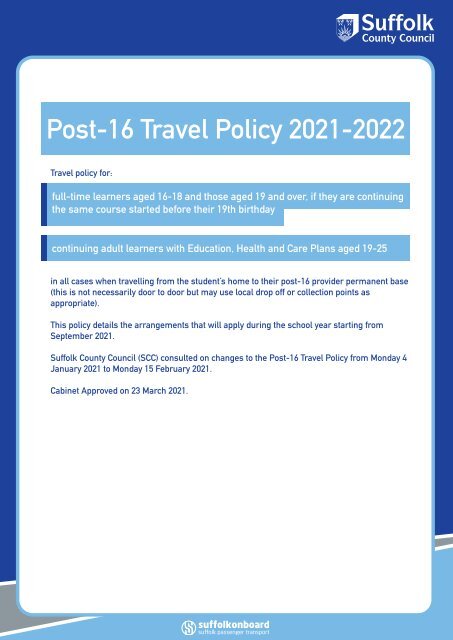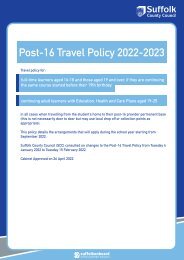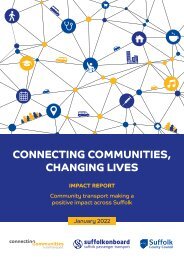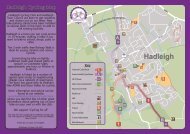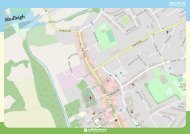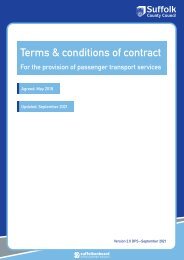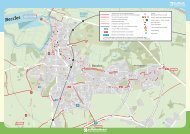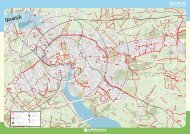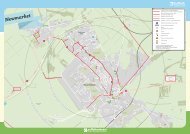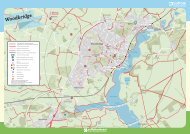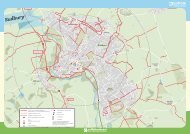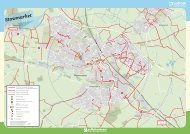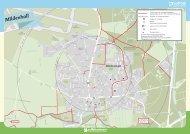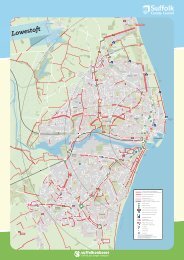Post-16 Travel Policy 2021-2022
- No tags were found...
You also want an ePaper? Increase the reach of your titles
YUMPU automatically turns print PDFs into web optimized ePapers that Google loves.
<strong>Post</strong>-<strong>16</strong> <strong>Travel</strong> <strong>Policy</strong> <strong>2021</strong>-<strong>2022</strong><br />
<strong>Travel</strong> policy for:<br />
full-time learners aged <strong>16</strong>-18 and those aged 19 and over, if they are continuing<br />
the same course started before their 19th birthday<br />
continuing adult learners with Education, Health and Care Plans aged 19-25<br />
in all cases when travelling from the student’s home to their post-<strong>16</strong> provider permanent base<br />
(this is not necessarily door to door but may use local drop off or collection points as<br />
appropriate).<br />
This policy details the arrangements that will apply during the school year starting from<br />
September <strong>2021</strong>.<br />
Suffolk County Council (SCC) consulted on changes to the <strong>Post</strong>-<strong>16</strong> <strong>Travel</strong> <strong>Policy</strong> from Monday 4<br />
January <strong>2021</strong> to Monday 15 February <strong>2021</strong>.<br />
Cabinet Approved on 23 March <strong>2021</strong>.
Section<br />
Contents<br />
Page<br />
Number<br />
Introduction 3<br />
Section 1: The criteria and how to apply for <strong>Post</strong>-<strong>16</strong> travel 5<br />
Section 2: Sustainable journey planning and travel alternatives 10<br />
Section 3:<br />
<strong>Post</strong>-<strong>16</strong> travel for students with Special Educational Needs and<br />
Disabilities (SEND)<br />
13<br />
Section 4: Exceptional circumstances 15<br />
Section 5: What you can do if you are unhappy with the decision made 18<br />
Section 6: Contact information and useful links 19<br />
Section 7: Glossary of terms 20
Introduction<br />
This policy applies to the <strong>2021</strong>/<strong>2022</strong> school year.<br />
There is a legal requirement for young people to continue in education or training until their<br />
18th birthday. Young people will need to continue to study or train in one of several ways:<br />
3<br />
• study full-time in a school, college or with a training provider (at least 540 hours of<br />
planned learning per year);<br />
• full-time work or volunteering (20 hours or more per week) combined with part-time<br />
education or training leading to relevant regulated qualifications (at least 280 hours<br />
of planned learning per year);<br />
• an apprenticeship (for more information see www.apprenticeships.org.uk);<br />
• supported internship or;<br />
• traineeship.<br />
This <strong>Post</strong>-<strong>16</strong> <strong>Travel</strong> <strong>Policy</strong> applies to:<br />
• full-time learners aged <strong>16</strong>-18 and those learners aged 19 and over continuing the<br />
same course started before they were 19<br />
• relevant adult learners with Education, Health and Care Plans aged 19-25.<br />
This policy does not apply to young people who are planning to take part in a traineeship, an<br />
apprenticeship or a supported internship.<br />
Sustainable journey planning and travel alternatives:<br />
Suffolk County Council (SCC) recommends that students plan their journeys to their intended<br />
<strong>Post</strong>-<strong>16</strong> provision early and that they only apply for subsidised travel from SCC if this proves<br />
to be the best option. Use SuffolkOnBoard Journey Planner and route lists to help you<br />
www.suffolkonboard.com/planner. It is important to consider what is the most affordable<br />
travel option as this will vary for each student.<br />
• Cheaper tickets can often be purchased directly from bus operators meaning there<br />
is no need to make an application to SCC. Young people can also contact bus<br />
operators directly to see what ticket options they offer. Details of all operators are<br />
available at www.suffolkonboard.com/operators.<br />
• Local bus services can offer cheaper ticket options for students. Termly or weekly<br />
discounted options are often available. Students and young people who are<br />
planning to take part in a traineeship, an apprenticeship or a supported internship,<br />
can use the Endeavour Card to gain a minimum of 25% off the daily adult charges<br />
on most public buses. Apply at www.endeavourcard.co.uk.<br />
• Some schools and <strong>Post</strong>-<strong>16</strong> colleges also run routes for <strong>Post</strong>-<strong>16</strong> students. We<br />
publish an up to date list and details of these, which can be found at<br />
www.suffolkonboard.com/gettingreadyforseptember.<br />
• Young people who are eligible for the English National Concessionary <strong>Travel</strong><br />
Scheme receive free off-peak travel. Further information can be found at<br />
www.suffolkonboard.com/concessionary-travel.<br />
• Greater Anglia offers various rail discount schemes for <strong>16</strong>-18 year olds such as<br />
the Scholar’s Season Ticket or the <strong>16</strong>-17 Saver Railcard. There is further
information on these below in Section 2. Please see<br />
www.greateranglia.co.uk/tickets-fares/business-travel/schoolcollege-traveldiscounts;<br />
railplus.greateranglia.co.uk/scholars.html;<br />
www.greateranglia.co.uk/tickets-fares/discounts/railcards/<strong>16</strong>-25.<br />
If you need to make an application for subsidised <strong>Post</strong>-<strong>16</strong> travel through SCC, please make<br />
the application before the deadline of 31 May <strong>2021</strong>.<br />
4
Section 1: The criteria and how to apply for <strong>Post</strong>-<strong>16</strong> travel<br />
Criteria<br />
SCC will provide <strong>Post</strong>-<strong>16</strong> travel in Years 12 and 13:<br />
1. to students who are attending their nearest school sixth form or <strong>Post</strong>-<strong>16</strong> centre,<br />
irrespective of the county boundary; or<br />
2. where a student’s nearest school sixth form is located outside of Suffolk, <strong>Post</strong>-<strong>16</strong><br />
travel will be provided to the nearest Suffolk school sixth form; or<br />
3. to enable students to attend the sixth form in their Transport Priority Area when travel<br />
to that school had been protected under the School <strong>Travel</strong> <strong>Policy</strong> for 5-<strong>16</strong> year olds in<br />
September 2019; when they:<br />
a) are full-time learners aged <strong>16</strong>-18, aged 19 or aged 19 and over continuing to<br />
attend the same course started before they were 19; or relevant adult learners with<br />
Education, Health and Care Plans aged 19-25;<br />
b) are undertaking an approved full-time course of further education study;<br />
c) are normally resident in Suffolk; and<br />
d) live at least three miles away from either their nearest school sixth form or <strong>Post</strong>-<strong>16</strong><br />
centre.<br />
For students wishing to study more specialist subjects or courses which are not available at<br />
any of the school sixth form or <strong>Post</strong>-<strong>16</strong> centre options above, applications will be considered<br />
on an individual exceptional basis. Applications will be offered only to the nearest centre<br />
offering this programme where this is needed to enable the student to progress (see Section<br />
4).<br />
Distance Measurement<br />
• SCC provides a <strong>Post</strong>-<strong>16</strong> <strong>Travel</strong> <strong>Policy</strong> which offers seats on a paying basis to<br />
students whose homes are more than 3 miles from any of the school sixth form or<br />
<strong>Post</strong>-<strong>16</strong> centre options above. Distances are measured by the shortest available<br />
walking route which includes Public Rights of Way within Suffolk and roads over<br />
county borders. Routes are calculated using a network comprised of the Ordnance<br />
Survey MasterMap Highways Network, which includes all roads and urban paths,<br />
and Public Rights of Way as shown on the Suffolk Definitive Map. Distances are<br />
measured from the point of the network that is closest to the address point selected<br />
to the nearest gate or access to the sixth form or <strong>Post</strong>-<strong>16</strong> centre.<br />
• Where a route has been considered unsafe by the Education Transport Appeals<br />
Committee, we will apply this to <strong>Post</strong>-<strong>16</strong> distance measurements.<br />
• The offer of <strong>Post</strong>-<strong>16</strong> travel may be from a "main road" rather than a home address.<br />
• Students may be delivered to or collected from a bus stop or drop-off/collection<br />
point and are responsible for the arrangement and cost of any additional travel<br />
required to complete their journey home or to their sixth form or <strong>Post</strong>-<strong>16</strong> centre.<br />
• <strong>Post</strong>-<strong>16</strong> travel arrangements for students with Special Educational Needs and<br />
Disabilities (SEND) (see glossary) are specifically covered in Section 3.<br />
Main Road Service<br />
Main road service means a family may be required to ensure the young person gets to<br />
the main road service to be picked up and collected from that point.<br />
5
Public Rights of Way<br />
Public Rights of Way include footpaths, bridleways, and other pathways, as well as<br />
recognised roads.<br />
Learners attending Colleges of Further Education who are pursuing courses such as Higher<br />
National Diplomas (HNDs), Diplomas of Higher Education or degrees are not eligible to<br />
receive discretionary <strong>Post</strong>-<strong>16</strong> travel. Students studying towards a particular Level 4<br />
qualification that is needed to enable the student to progress will be considered on an<br />
individual exceptional basis (see Section 4).<br />
Apprenticeships<br />
SCC does not provide <strong>Post</strong>-<strong>16</strong> travel for apprenticeships on the basis that the young person<br />
is earning a wage. The <strong>Post</strong>-<strong>16</strong> <strong>Travel</strong> <strong>Policy</strong> is discretionary, and the level of subsidy<br />
provided by SCC is for those in full-time education.<br />
SCC does however provide the Endeavour Card for all young people, which includes those<br />
participating on traineeships, supported internships and apprenticeships. To apply visit<br />
www.endeavourcard.co.uk.<br />
When to apply for <strong>Post</strong>-<strong>16</strong> travel<br />
If the best option for a student is to apply for SCC <strong>Post</strong>-<strong>16</strong> travel, they will need to make an<br />
application before 31 May <strong>2021</strong> deadline. You do not need to wait for a formal acceptance<br />
on a course before applying for <strong>Post</strong>-<strong>16</strong> travel.<br />
Apply before 31 May <strong>2021</strong> to ensure you have a travel pass for the start of term. Any<br />
applications made after 31 May <strong>2021</strong> will be considered as a late application and may mean<br />
that a travel pass will not be received by the start of the autumn term <strong>2021</strong>.<br />
Applications should be made online at www.suffolkonboard.com/apply.<br />
When examination results are received, students can make changes to their travel<br />
application. This can be done online, and you will need to make a new application if it is to a<br />
different establishment and/or course.<br />
To enable SCC to assess whether students are eligible for <strong>Post</strong>-<strong>16</strong> travel, the application<br />
must include the student’s home address and course details. SCC will assess the application<br />
when the student is in Year 11 and planning their <strong>Post</strong>-<strong>16</strong> education. Students need to apply<br />
once every school year by 31 May, or whenever they have a change of circumstances, such<br />
as a change of address. SCC will assess eligibility each time a student starts a new course.<br />
For further information on <strong>Post</strong>-<strong>16</strong> travel please visit www.suffolkonboard.com/optin, or<br />
contact the Passenger Transport Team on 0345 606 6173.<br />
Tickets and payment arrangements<br />
SCC expects all <strong>Post</strong>-<strong>16</strong> students to make a payment towards the cost of travel.<br />
The actual average annual cost to SCC for <strong>Post</strong>-<strong>16</strong> travel arrangements as at April 2020,<br />
was:<br />
• £1,205 per student without Special Educational Needs and Disability (SEND)<br />
• £5,895 for students with SEND<br />
6
This means for 2020/<strong>2021</strong> SCC is, on average, subsidising each seat by £365, and for<br />
students with SEND this is £5,175 per year.<br />
As agreed by Cabinet in June 2014, financial contributions will increase each year as shown<br />
in the tables below.<br />
The anticipated annual charges for a seat for the following three years are currently predicted<br />
to be:<br />
7<br />
School Year Autumn term Spring term Summer term Total per year<br />
<strong>2021</strong>/<strong>2022</strong> £310 £310 £310 £930<br />
<strong>2022</strong>/2023 £340 £340 £340 £1,020<br />
2023/2024 £370 £370 £370 £1,110<br />
This includes an increase of up to £30 per term (£90 per year) until they reach the average<br />
cost of a spare seat.<br />
For students with SEND, the anticipated costs are currently expected to be:<br />
School Year Autumn term Spring term Summer term Total per year<br />
<strong>2021</strong>/<strong>2022</strong> £250 £250 £250 £750<br />
<strong>2022</strong>/2023 £260 £260 £260 £780<br />
2023/2024 £270 £270 £270 £810<br />
This includes an increase of up to £10 per term (£30 per year) until they reach the average<br />
cost of a spare seat.<br />
If individual students, aged 19-25, have an EHC Plan that states that travel is a necessity,<br />
their travel will be arranged free of charge.<br />
All students may either make a single annual payment or pay the charge in three termly<br />
instalments or half termly payments. You can pay online or by phone, by using the following<br />
link www.suffolkonboard.com/pay or by calling our Automated Telephone Payments (ATP)<br />
service and the phone number will be included on your invoice statement.<br />
Each term an invoice will be sent for the next term. Payment of this invoice will ensure travel<br />
arrangements continue.<br />
Each ticket is issued for a daily return journey on a specific route; these are not transferrable<br />
to any other route. Full details are available in the terms and conditions provided when an<br />
application is made.<br />
There are usually no concessions for students on low incomes. A bursary scheme is available<br />
on the GOV.UK website at www.gov.uk/<strong>16</strong>19-bursary-fund (see page 8 for more information).<br />
Bursaries, if available, are administered via the student’s <strong>Post</strong>-<strong>16</strong> provider. Please check<br />
their policy and eligibility criteria.<br />
Students should also contact local operators to check for prices to obtain the best possible<br />
deals, because it may be that these are less than the SCC charges.
Refunds<br />
SCC will not provide refunds when other fares are incurred whilst waiting for a travel pass<br />
due to making a late application or failure to provide a photo. However, refunds may be<br />
available in certain circumstances. Details about refunds are provided in the terms and<br />
conditions at the time of application for <strong>Post</strong>-<strong>16</strong> travel.<br />
<strong>16</strong>-19 Bursary Fund<br />
The Government has committed to fully fund education and training places for all <strong>16</strong>-19 year<br />
olds. There may be financial help available for students who are struggling with additional<br />
costs.<br />
The <strong>16</strong>–19 Bursary Fund can provide two types of bursary: the first, known as a “vulnerable<br />
bursary” can provide up to £1,200 a year to eligible disadvantaged young people; and the<br />
second, known as a “discretionary bursary”, is controlled by schools and colleges who can<br />
decide to offer bursaries from a specific budget given to them for this purpose.<br />
The school or college can choose to give a discretionary bursary to any students who are<br />
finding it difficult to pay costs like travel arrangements, meals or books and equipment.<br />
Except for those most in need, they will decide on the amount, when it is paid, and whether it<br />
is linked to behaviour or attendance. You can find more information at www.gov.uk/<strong>16</strong>19-<br />
bursary-fund.<br />
To be eligible the student needs to be:<br />
• at least <strong>16</strong> and under 19 years old on 31 August <strong>2021</strong><br />
• studying at a publicly funded school or college, or on an unpaid training course<br />
• meet the residency requirements - the school or college can check this.<br />
To receive a vulnerable bursary of up to £1,200, the student needs to meet one or more of<br />
the following four criteria:<br />
• in or recently left local authority care<br />
• receive Income Support or Universal Credit because they are financially<br />
supporting themselves<br />
• get Disability Living Allowance (DLA) in their name and either Employment and<br />
Support Allowance (ESA) or Universal Credit<br />
• get Personal Independence Payment (PIP) in their name and either ESA or<br />
Universal Credit.<br />
The student may receive a bursary if undertaking a full-time course (at least 30 weeks study).<br />
The school or college will identify if the vulnerable student meets the criteria and if so, will<br />
make a claim to the Student Bursary Support Service.<br />
In assessing if the vulnerable student meets the criteria for this bursary, the school or <strong>Post</strong>-<strong>16</strong><br />
centre will want to seek appropriate evidence from the student. This could be, for example:<br />
• a letter setting out the benefit or benefits to which the student is entitled.<br />
• written confirmation of the student’s current or previous looked-after status from<br />
the local authority which looks after them or provides their leaving care services.<br />
8
We would advise students or families to make contact with the school or <strong>Post</strong>-<strong>16</strong> centre for<br />
any help or further information. All schools and <strong>Post</strong>-<strong>16</strong> centres in Suffolk will be able to<br />
provide information as part of their arrangements for entering <strong>Post</strong>-<strong>16</strong> programmes.<br />
(<strong>16</strong>-19 Bursary Fund information is correct as at November 2020.)<br />
9
Section 2: Sustainable journey planning and travel alternatives<br />
As students plan their <strong>Post</strong>-<strong>16</strong> pathway, SCC encourages them to think about the impact on<br />
the environment when planning their journey. There are many sustainable travel options to<br />
consider including:<br />
10<br />
• Walking to and from school or college;<br />
• Using a bicycle;<br />
• Using a motorcycle or moped;<br />
• Using car sharing options;<br />
• Accessing public transport (including using the Endeavour Card where applicable);<br />
or use the local rail network and take advantage of the various discounts on offer<br />
from Greater Anglia.<br />
For further information on sustainable travel arrangements see<br />
www.suffolkonboard.com/SMOT.<br />
The Endeavour Card<br />
Young people aged between <strong>16</strong> and 19 whose journey begins or ends in Suffolk can make<br />
use of the Endeavour Card. This card gives young people a minimum of 25% discount on an<br />
adult daily bus fare and can be used at weekends, in the evening or during school holidays.<br />
The only bus operators who currently do not accept the Endeavour Card are Beestons and<br />
Stagecoach.<br />
The young person does not need to be in full-time <strong>Post</strong>-<strong>16</strong> education to benefit from the<br />
Endeavour Card. To apply online for an Endeavour Card, go to www.endeavourcard.co.uk. If<br />
you have any questions regarding the scheme, please contact 0345 606 6173.<br />
English National Concessionary <strong>Travel</strong> Scheme<br />
SCC provides free travel on local bus services during off peak hours for those who are<br />
eligible via age or disability. Further information can be found at<br />
www.suffolkonboard.com/concessionary-travel.<br />
Some students may be able to use their disability living allowance to support their travel<br />
needs. Further information is available at www.gov.uk/disability-living-allowance-dla-rates.<br />
The Spare Seat <strong>Policy</strong><br />
SCC has a Spare Seat <strong>Policy</strong>. Spare seats may be available on a SCC dedicated route<br />
running to schools. After seats have been allocated to all pupils who are eligible to SCC<br />
funded school travel, there may be spare seats available to purchase. The availability of<br />
spare seats is not usually known before mid-August each year.<br />
SCC can only sell up to 20% of the seats on a vehicle under Public Service Vehicle<br />
Accessibility Regulations (PSVAR) 2000 and so it is possible that SCC may be prohibited<br />
from offering spare seats on some routes, even though there would appear to be seats<br />
available.<br />
Note: Routes are subject to routine review and demand may mean that the routes are<br />
redesigned or cease. Therefore, an offer of a discretionary spare seat cannot be guaranteed<br />
to continue to be available. This is because demand for those with eligibility may increase
and they will have priority. This may mean that the offer of a spare seat is removed.<br />
The application process opens on 1 July <strong>2021</strong>. A discretionary spare seat may be available<br />
upon request. Spare seats will be allocated according to the criteria as set out in the Spare<br />
Seat <strong>Policy</strong>. Passes may not be received before the start of the school year. The termly<br />
charge for a spare seat for the <strong>2021</strong>/<strong>2022</strong> school year is £310 (£930 per year).<br />
Each year the cost of a spare seat will rise by £90 until it reaches the average cost of a spare<br />
seat (which in 2020/<strong>2021</strong> was £1,205) when the annual increase will then revert to £10 per<br />
term (£30 per year).<br />
For students with SEND (where they are not eligible for <strong>Post</strong>-<strong>16</strong> travel funded by SCC) who<br />
wish to purchase a spare seat, where available, the charge will be £750 per annum for school<br />
year <strong>2021</strong>/<strong>2022</strong>. The termly charge will be £250 per student per seat. Each year the cost of a<br />
spare seat will rise by £30 per year (£10 per term).<br />
For more information, please see www.suffolkonboard.com/spareseats.<br />
Connecting Communities<br />
When students need to make a journey and there is no public transport available locally,<br />
there may be a Connecting Communities service available in the area. This may be able to<br />
connect to an appropriate bus route or train link for onward travel so that the student can<br />
reach their destination. For journeys where connecting to other services is inappropriate, end<br />
to end journeys may be possible.<br />
The Connecting Communities service is charged like a bus fare and the Endeavour Card can<br />
be used to receive a discount on the fare. Contact the local area operator up to a week<br />
before the journey is to take place. Local operators and further information can be found at<br />
www.suffolkonboard.com/cc/myarea.<br />
Getting Ready for September <strong>2021</strong><br />
Some sixth forms and <strong>Post</strong>-<strong>16</strong> centres also run routes for <strong>Post</strong>-<strong>16</strong> students. We publish an<br />
up to date list and details of these, which can be found at<br />
www.suffolkonboard.com/gettingreadyforseptember.<br />
Bus Operators<br />
Various discount and pre-payment schemes are available from most bus operators and these<br />
vary depending on the company. Please see www.suffolkonboard.com/buses/contacts.<br />
Rail Operator<br />
Greater Anglia offers a variety of discount options for those over <strong>16</strong> years:<br />
• A Scholar Season Ticket offers <strong>16</strong>-18 year olds up to 50% off travel between two<br />
Greater Anglia railway stations for full-time students travelling to named sixth<br />
forms and <strong>Post</strong>-<strong>16</strong> centres in Essex, Suffolk, Norfolk and Cambridgeshire when<br />
they buy a weekly, termly or annual season ticket. Further details can be found at<br />
railplus.greateranglia.co.uk/scholars.html.<br />
• Young people aged <strong>16</strong>-17 years are eligible for the <strong>16</strong>-17 Saver card that gives a<br />
50% discount on tickets for a payment of £30 per year. For further information go<br />
to www.<strong>16</strong>-17saver.co.uk.<br />
11
• There is the <strong>16</strong>-25 national railcard which costs £30 per year. Students aged <strong>16</strong>-<br />
25 can save one third off most rail fares with a <strong>16</strong>-25 national railcard. Discount<br />
train tickets, available with the <strong>16</strong>-25 national railcard, include all Advance<br />
Standard Class tickets and some Advance First Class fares. Please note that not<br />
every ticket type is available for every journey that the student may wish to make,<br />
and that time and train restrictions and/or minimum fares may apply. For example,<br />
a £12 minimum fare applies for journeys starting between 4.30am-10am Monday<br />
to Friday excluding Advance Fares. This minimum fare does not apply on Public<br />
Holidays or throughout July and August. Railcard discounts do not apply to tickets<br />
bought on trains. For further information see www.<strong>16</strong>-25railcard.co.uk.<br />
Use the Journey Planner on SuffolkOnBoard to plan journeys to schools and colleges<br />
www.suffolkonboard.com/planner.<br />
Moped Hire<br />
Parents could consider investigating options with moped hire companies such as:<br />
www.scoots-hire.com<br />
www.kickstartmopeds.org.uk.<br />
It is a parent’s responsibility to consider the suitability of these companies and the young<br />
person’s abilities/capabilities/needs.<br />
The Suffolk Brokerage Service<br />
The Suffolk Brokerage Service may be able to provide help to students who do not otherwise<br />
qualify for <strong>Post</strong>-<strong>16</strong> travel as follows:<br />
• All schools, sixth form centres and colleges of further education are able to make<br />
use of the Suffolk Brokerage Service, in terms of capacity building support, and<br />
widening access solutions funded by partner(s).<br />
• The Brokerage Service would work with the full range of commercial bus, coach<br />
and minibus operators to promote the commercial opportunities available in<br />
running routes to <strong>Post</strong>-<strong>16</strong> provision, linking together families and relevant <strong>Post</strong>-<strong>16</strong><br />
providers where there is commercial demand.<br />
• Signposting is available to families and young people as they plan their <strong>Post</strong>-<strong>16</strong><br />
pathway. This service includes the promotion of a variety of journey planners and<br />
apps to help families make their personal travel plans.<br />
12
Section 3: <strong>Post</strong>-<strong>16</strong> travel for students with Special Educational Needs and<br />
Disabilities (SEND)<br />
<strong>Post</strong>-<strong>16</strong> Students with SEND without an Education, Health and Care (EHC) Plan<br />
Students with SEND but without an EHC Plan including those unable to travel independently,<br />
will be provided with subsidised <strong>Post</strong>-<strong>16</strong> travel to their nearest school sixth form or <strong>Post</strong>-<strong>16</strong><br />
centre if they satisfy the following four criteria:<br />
13<br />
a) are full-time learners aged <strong>16</strong>-18;<br />
b) are undertaking an approved full-time course of further education study;<br />
c) are normally resident in Suffolk;<br />
d) live at least three miles away from either their school sixth form or <strong>Post</strong>-<strong>16</strong> centre.<br />
For students wishing to study more specialist subjects or courses which are not available at<br />
their nearest school sixth form or <strong>Post</strong>-<strong>16</strong> centre, applications will be considered on an<br />
individual exceptional basis. Applications will be offered only to the nearest centre offering<br />
this programme where this is needed to enable the student to progress (see Section 4).<br />
<strong>Travel</strong> Arrangements for students with SEND (see glossary) may be provided irrespective of<br />
the minimum distance and other criteria set out in this policy. This is only where it is accepted<br />
by SCC that travel arrangements are necessary to enable the young person to access the<br />
education they require. SCC will assess students’ needs against the list in Section 4.<br />
Students with an EHC Plan<br />
For students with an EHC Plan funded <strong>Post</strong>-<strong>16</strong> travel is not generally available but<br />
subsidised travel will be provided to their nearest suitable school sixth form or <strong>Post</strong>-<strong>16</strong> centre.<br />
If the student or their parents request a placement that is not at their nearest suitable<br />
provision, they will need to make their own travel arrangements. Where there are exceptional<br />
circumstances, these will be considered (see Section 4).<br />
In accordance with Section 9.215 of the SEN Code of Practice 0-25 Years travel will be<br />
recorded in EHC Plans only in exceptional cases. <strong>Travel</strong> arrangements will be considered as<br />
part of the EHC Plan needs assessment or at the annual review.<br />
If individual students, aged 19-25, have an EHC Plan that states that travel is a necessity,<br />
their travel will be arranged free of charge. Any individual exceptional needs will be<br />
considered on an individual case by case basis, and, if approved, will also be free of charge.<br />
Notes: <strong>Travel</strong> arrangements will be discussed with families and young people when looking<br />
at the student’s options for <strong>Post</strong>-<strong>16</strong>.<br />
The travel needs of students with SEND should be reassessed when a young person moves<br />
from compulsory schooling to <strong>Post</strong>-<strong>16</strong> education and subsequently when they start a new<br />
course.<br />
SCC will make arrangements to undertake an assessment in Year 11, when their transition to<br />
<strong>Post</strong>-<strong>16</strong> education is being planned.<br />
Independent travel training for students with SEND<br />
Independent <strong>Travel</strong> Training (ITT) is a free service which helps students to become safe and
independent travellers. SCC works with schools and colleges to deliver the training. ITT<br />
offers a key skill that opens up opportunities for young people as they move into adulthood by<br />
giving them the confidence to travel independently to education, employment, training and<br />
socially.<br />
<strong>Post</strong>-<strong>16</strong> students with SEND who require travel will be assessed for ITT by SCC’s ITT<br />
provider. Students who are assessed by SCC as being unlikely to benefit from such training<br />
due to severe physical or learning disabilities will not be put forward for this training.<br />
The initial assessment would be completed by the end of the first term of <strong>Post</strong>-<strong>16</strong> education.<br />
If students are assessed by the training provider as being able to participate in this training,<br />
they will be supported to complete it. A training plan will be created for the student, taking into<br />
account suitable routes and travel options. A home visit will take place to talk about the plan<br />
with the student and the parent or carer.<br />
Our trainers work one to one with all students and adults over a number of weeks to train and<br />
assess their ability to make their journeys independently. Once the trainer is confident that<br />
the student is ready to become an independent traveller their training will be signed off, and<br />
the student will receive a certificate. The training can take from a few weeks to several<br />
months to complete, and as long as the student is making progress the trainer will continue to<br />
provide this. The trainer will also give parents regular updates on the student’s progress.<br />
If appropriate, travel will be provided whilst the training takes place and the student would be<br />
required to continue to make the stated <strong>Post</strong>-<strong>16</strong> financial contribution. Refusal to participate<br />
in the training may lead to the withdrawal of <strong>Post</strong>-<strong>16</strong> travel and may affect any future<br />
requests for SCC travel.<br />
Once training has been completed successfully, we will arrange for travel passes to be<br />
issued for the student to use the travel route identified in the training as their method of <strong>Post</strong>-<br />
<strong>16</strong> travel. Taxis will not be provided to students once successful training has been completed,<br />
unless exceptional circumstances are identified by SCC. If a student is not signed off by the<br />
ITT service as having successfully completed the training to travel safely and independently,<br />
then travel will continue to be provided.<br />
If a student is assessed by the ITT service as not being able to do travel training at that time<br />
they will recommend if or when a reassessment may be appropriate. SCC will continue to<br />
provide suitable travel for the <strong>Post</strong>-<strong>16</strong> student in the meantime.<br />
SCC can offer successful trainees <strong>Post</strong>-<strong>16</strong> bus passes for the appropriate termly fee, but it<br />
may be more cost effective for the student to use a Disabled Person’s bus pass which allows<br />
free travel on public bus services after 9.30am. If used in conjunction with SCC’s Endeavour<br />
Card for journeys before 9.30am, it can significantly reduce travel costs. For rail journeys<br />
there is a Disabled Person’s railcard offering a third off rail fares (see<br />
www.railcard.co.uk/disabled-persons).<br />
To find out more about ITT, please contact the Passenger Transport Team on 0345 606<br />
6173; or email Transport<strong>Travel</strong>Training@suffolk.gov.uk.<br />
14
Section 4: Exceptional circumstances<br />
SCC has a responsibility to provide travel to help young people participate in <strong>Post</strong>-<strong>16</strong><br />
education and training. SCC also has the discretion to charge for such provision. Applications<br />
will be considered on an individual basis to determine whether there are exceptional<br />
circumstances which justify departure from the general policy.<br />
In line with Suffolk’s School <strong>Travel</strong> <strong>Policy</strong> <strong>2021</strong>/<strong>2022</strong>, students of sixth form age fulfilling the<br />
criteria in Section 2 will be offered subsidised travel to either:<br />
1. their nearest school sixth form or <strong>Post</strong>-<strong>16</strong> centre, irrespective of the county boundary;<br />
or<br />
2. where a student’s nearest school sixth form is located outside of Suffolk, <strong>Post</strong>-<strong>16</strong><br />
travel will be provided to the nearest Suffolk school sixth form; or<br />
3. to enable students to attend the sixth form in their Transport Priority Area when travel<br />
to that school had been protected under the School <strong>Travel</strong> <strong>Policy</strong> for 5-<strong>16</strong> year olds in<br />
September 2019; when they:<br />
a) are full-time learners aged <strong>16</strong>-18, aged 19 or aged 19 and over continuing to<br />
attend the same course started before they were 19; or relevant adult learners with<br />
Education, Health and Care Plans aged 19-25;<br />
b) are undertaking an approved full-time course of further education study;<br />
c) are normally resident in Suffolk; and<br />
d) live at least three miles away from either their nearest school sixth form or <strong>Post</strong>-<strong>16</strong><br />
centre.<br />
Based on individual exceptional circumstances, the policy also provides:<br />
• help for students wishing to study more specialist subjects or courses which are<br />
not available at their local school or <strong>Post</strong>-<strong>16</strong> centre. Applications will be considered<br />
on an individual exceptional basis to the nearest centre offering this programme,<br />
where this is needed to enable the student to progress (further information below).<br />
• help for vulnerable students. The intention is that wherever possible no student<br />
aged <strong>16</strong>-18 in Suffolk will be prevented from continuing in <strong>Post</strong>-<strong>16</strong> education at<br />
their nearest suitable provision because of the cost or availability of travel.<br />
Where provision of travel is agreed as an exception, SCC will request the student to make<br />
the subsidised financial contribution towards the cost of this.<br />
However, when assessing applications SCC will take into account factors such as, but not<br />
limited to the financial situation and ability to pay the subsidised financial contribution; the<br />
availability of other funds to cover travel costs (for example <strong>16</strong>-19 Bursary Fund); and the<br />
number of years the <strong>Post</strong>-<strong>16</strong> provision is expected to last. SCC will consider all supporting<br />
evidence provided.<br />
Exceptional Specialist Provision<br />
For students wishing to study more specialist courses or particular subject combinations not<br />
available at their local school sixth form or <strong>Post</strong>-<strong>16</strong> centre, applications may be submitted to<br />
SCC for consideration on an exceptional basis to the nearest centre offering the course. The<br />
following guidelines will be used in assessing individual exceptions:<br />
15
Specialist Course<br />
Applications will be considered if a student wishes to study a specific course not available at<br />
their nearest school sixth form or <strong>Post</strong>-<strong>16</strong> centre, and no comparable equivalent is<br />
available. Applicants should clearly state reasons for the chosen course and how that course<br />
will aid their intended career progression. SCC will consider all supporting evidence provided.<br />
A-Level Subject Combinations<br />
Exceptional applications will be considered if:<br />
• the majority (that is 50% or more) of the student’s programme cannot be studied at<br />
their nearest school sixth form or <strong>Post</strong>-<strong>16</strong> centre – usually this will mean 2 of 4<br />
subjects are not available.<br />
• more than 50% of the A-level offer is available at the nearest provider but the<br />
student requires a particular A-level subject to access Higher Education for a<br />
specific career path and no comparable equivalent is available at the nearest<br />
provider. For example: A-level Music is usually an essential requirement to study a<br />
Music degree so this would be supported whereas A-level Psychology is not an<br />
essential prerequisite to study a Psychology degree so this would not be<br />
supported.<br />
The following activities or additional subjects will not be considered for an exception:<br />
• Extra-curricular activities, for example, Sports Academies, Drama clubs, Duke of<br />
Edinburgh;<br />
• A-level General Studies / Critical Thinking;<br />
• Extended Projects.<br />
If travel is provided due to specialist provision SCC has the right to undertake checks during<br />
the academic year.<br />
Those with SEND and vulnerable learners<br />
Usually where travel is provided, it would only be available at the beginning and end of the<br />
school/college day. Only in exceptional circumstances connected to an individual’s special<br />
educational needs and/or disabilities, and where no alternative mode of travel is available,<br />
would taxi travel be considered.<br />
Any request for a review of individual travel needs for students with SEND or vulnerable<br />
students (as published in Section 3 of the policy) will follow the appeals procedures. The<br />
initial appeal will be considered at Stage 1 review of the appeals process, supporting<br />
evidence would be required – this can include the information held by SCC in the young<br />
person’s EHC Plan. If the Stage 1 review is refused, a parent or student may decide to make<br />
a Stage 2 appeal.<br />
More information on School <strong>Travel</strong> Appeals can be found in Section 5 and on our website at<br />
www.suffolkonboard.com/appeals.<br />
Assessment for learners with SEND<br />
When determining whether to provide <strong>Post</strong>-<strong>16</strong> travel SCC will consider:<br />
<strong>16</strong>
• The needs of those young people, who without <strong>Post</strong>-<strong>16</strong> travel support, would be<br />
unable to attend an education or training establishment;<br />
• Distance and journey time from the young person’s home to establishments of<br />
education and training and the cost of travel. Reasonable maximum one-way<br />
travel is usually considered to be 75 minutes;<br />
• The nature of the route or alternative routes which the student could reasonably be<br />
expected to take;<br />
• The reasons why a student wishes to attend one establishment rather than<br />
another, where it makes sense to do so;<br />
• Anything recorded in an EHC Plan about travel to the <strong>Post</strong>-<strong>16</strong> provider;<br />
• Where there is a nearer institution which is suitable and can provide the same or<br />
similar qualification(s) or course;<br />
• The best use of SCC’s resources;<br />
• The nature of the student’s SEND. This includes the physical ability of the young<br />
person to walk, accompanied as necessary by a responsible adult to the learning<br />
provision or a pick-up point;<br />
• Whether the young person has received ITT skills, is able to travel independently<br />
and his or her ability to access public transport or transport operated by others;<br />
• Information contained in the assessment made under the Children and Families<br />
Act 2014 and, where applicable, the Chronically Sick and Disabled Persons Act<br />
1970, the Children Act 1989, and the Care Act 2014, together with any other<br />
relevant information supplied;<br />
• SCC’s legal obligations and, in particular, those imposed by the Equality Act 2010<br />
and Human Rights Act 1998.<br />
When considering such matters, SCC will seek to consider supporting evidence from<br />
professionals and others currently working with the student and/or their family. This may<br />
include the education setting and relevant information provided in an EHC Plan.<br />
17
Section 5: What you can do if you are unhappy with the decision made<br />
SCC’s <strong>Post</strong>-<strong>16</strong> <strong>Travel</strong> <strong>Policy</strong> is applied consistently and fairly throughout Suffolk. If students<br />
or families are advised that they are not eligible for <strong>Post</strong>-<strong>16</strong> travel and they disagree with the<br />
decision, they can take the following steps:<br />
Contact the Passenger Transport Team within 20 working days of the decision date and<br />
ask for a Stage 1 review. Further details can be found at www.suffolkonboard.com/appeals.<br />
If students or their families remain dissatisfied, they can raise their concerns through the<br />
Corporate Complaints procedure, by contacting the SCC Complaints team (Customer<br />
Rights), Suffolk County Council, Endeavour House, 8 Russell Road, Ipswich IP1 2BX.<br />
Telephone 01473 260711 or email customerrights@suffolk.gov.uk.<br />
If the above does not result in a satisfactory outcome, students or their families can contact<br />
the Local Government and Social Care Ombudsman (LGSCO) or complain to the Secretary<br />
of State for Education. The LGSCO is an independent organisation that looks into complaints<br />
against councils. This is a free service and information can be found online at<br />
www.lgo.org.uk.<br />
To complain to the Secretary of State, students or their families should use the contact form<br />
on the Department for Education’s website www.education.gov.uk/help/contactus.<br />
18
Section 6: Contact information and useful links<br />
Information about this policy is available on SCC’s website www.suffolkonboard.com/policies.<br />
General information about public transport arrangements in Suffolk can be found at<br />
www.suffolkonboard.com.<br />
Contact information for all schools with <strong>Post</strong>-<strong>16</strong> provision in Suffolk can be found at<br />
www.suffolk.gov.uk/children-families-and-learning/schools.<br />
SCC annually produces the guide ‘Admissions to Schools in Suffolk’ and Directories of<br />
Schools in Suffolk which provide detailed information about education in Suffolk, including<br />
contact points for all schools and sixth form colleges. These can be accessed through the<br />
SCC website at www.suffolk.gov.uk/admissions.<br />
Contact information for colleges and <strong>Post</strong>-<strong>16</strong> centres in Suffolk can be found on their<br />
websites.<br />
For information about the English National Concessionary <strong>Travel</strong> scheme contact SCC at<br />
www.suffolkonboard.com/concessionary-travel.<br />
If you live in a rural area and have difficulty in accessing public transport, find out about<br />
eligibility to loan a moped to get to college or work at:<br />
www.scoots-hire.com<br />
www.kickstartmopeds.org.uk.<br />
The Department for Education’s website on subsidised travel to school or college for young<br />
people over <strong>16</strong> years can be accessed using the following link www.gov.uk/subsidisedcollege-transport-<strong>16</strong>-19.<br />
Alternatively, information about SCC’s <strong>Post</strong>-<strong>16</strong> <strong>Travel</strong> <strong>Policy</strong>, details of other points of contact<br />
and application forms are available by contacting:<br />
Suffolk County Council Passenger Transport Team<br />
Constantine House,<br />
5 Constantine Road,<br />
Ipswich IP1 2DH<br />
Phone: 0345 606 6173<br />
E-mail: transport.service@suffolk.gov.uk<br />
19
Section 7: Glossary of terms<br />
Adult Learner<br />
A person who is receiving education and is aged nineteen or above but is not a “young<br />
person of sixth form age” as defined below.<br />
Apprenticeship<br />
An Apprenticeship is a paid job where the apprentice will receive a wage and other<br />
employment benefits such as paid holiday. Apprenticeships combine on and off the job<br />
training and although they may possibly be working towards accredited training, they will be<br />
classed as ‘in employment’.<br />
An Apprenticeship combines on the job learning with a working environment. An<br />
Apprenticeship includes on the job learning with an employer as well as learning with a<br />
college or training provider to achieve a combination of qualifications. All apprentices earn a<br />
salary, have a full-time placement and take between one year and five years to complete,<br />
depending on the level of Apprenticeship and the industry sector. Apprenticeships range from<br />
Level 2 (equivalent to 5 GCSEs) to Higher Apprenticeship and Degree Apprenticeships<br />
(equivalent to a foundation degree and above).<br />
Education, Health and Care Plan (EHC Plan)<br />
The majority of young people with SEND will have the support they need within local<br />
mainstream schools or colleges. For some young people, an EHC Plan will be written<br />
following an assessment. This sets out the young person’s additional education, health and<br />
social care needs and the support that is necessary to help them to progress in their learning<br />
and to develop skills that will support them in adulthood. The EHC Plan will name the<br />
education setting that the young person will attend. EHC Plans are reviewed at least once a<br />
year, checking whether details need to be updated, progress is being made and the<br />
education setting does not need to change. For a small number of young people, an EHC<br />
Plan can remain active until they are aged 25.<br />
Local Offer<br />
The policy documents on <strong>Post</strong>-<strong>16</strong> travel are published on Suffolk’s Local Offer website<br />
www.suffolklocaloffer.org.uk.<br />
Special Educational Needs and Disabilities (SEND)<br />
A child or young person has SEND if they have a learning difficulty or disability which calls for<br />
special educational provision to be made for him or her. Special educational provision is<br />
required where the child or young person has a significantly greater difficulty in learning than<br />
the majority of others of the same age, or has a disability which prevents or hinders them<br />
from making use of educational facilities of a kind generally provided for others of the same<br />
age in mainstream schools or mainstream <strong>Post</strong>-<strong>16</strong> institutions. Please note, <strong>Post</strong>-<strong>16</strong> centres<br />
often use the term Learning Difficulties and Disabilities (LDD), but the term SEND is used in<br />
this policy, and may be used between ages 19-25 where a young person continues to have<br />
an EHC Plan.<br />
Supported Internship<br />
A supported internship is one type of study programme specifically aimed at young people<br />
aged <strong>16</strong> to 24 who have an EHC plan, who want to move into employment and need extra<br />
support to do so.<br />
20
Supported internships are structured study programmes based primarily at an employer.<br />
They are intended to enable young people with learning difficulties and/or disabilities to<br />
achieve sustainable, paid employment by equipping them with the skills they need for work<br />
through learning in the workplace. Internships normally last for a year and include unpaid<br />
work placements of at least six months. Wherever possible, they support the young person to<br />
move into paid employment at the end of the programme. Students complete a personalised<br />
study programme which includes the chance to study for relevant substantial qualifications, if<br />
suitable, and English and mathematics to an appropriate level.<br />
Sustainable Journey Planning<br />
To plan sustainable journeys by using a range of travel options and information available.<br />
Sustainable Modes of <strong>Travel</strong> (SMOT)<br />
Those that may improve the physical well-being of the individuals who use them, the<br />
environmental well-being of all or part of the local authority’s area, or a combination of the<br />
two. SCC’s SMOT plan can be found at www.suffolkonboard.com/SMOT.<br />
<strong>Travel</strong> Arrangements<br />
Includes different modes of travel. Priority will be given to public bus services, the offer<br />
(where applicable) of a mileage allowance or an individual alternative, and sustainable<br />
modes of travel. These alternatives may include for example walking (with a travel<br />
assistant/aid) and cycling. <strong>Travel</strong> support may also include the supply of a discount travel<br />
card, where applicable.<br />
The mode of travel may be a local bus route, a SCC route, a route run by a school or college,<br />
or train travel. This will take account of cost-effectiveness and ensuring travel is available to<br />
meet a young person’s individual circumstances.<br />
Traineeship<br />
Traineeships are demand led study programmes which can benefit young people if they are<br />
within six months of being able to get sustainable employment or an Apprenticeship.<br />
Traineeships last a minimum of six weeks and a maximum of six months and have a core<br />
component of work experience. They should also include study towards English and<br />
mathematics qualifications. Young people on a traineeship are classified as ‘students’ and do<br />
not get paid for their work experience.<br />
The primary objective of a traineeship is to progress the trainee to an Apprenticeship or other<br />
sustainable jobs. Alternatively, the trainee could enrol on a course of further learning<br />
including a full-time study programme at level 2 or 3.<br />
Young person of sixth form age<br />
Those over compulsory school age, aged <strong>16</strong>-18 and those continuing learners who started<br />
their programme of learning before their 19th birthday.<br />
21


